-
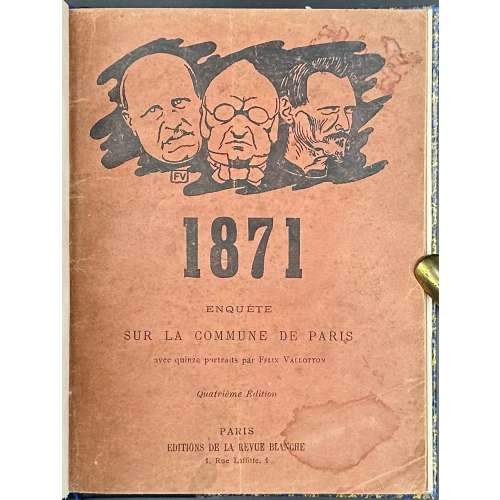 Hardcover, 20.2 x 15.5 cm, owner’s half blue morocco binding over marbled boards with gilt lettering to spine, marbled endpapers, extracts from La Revue Blanche, numbers 91 and 92 of March 15 and April 1 of 1897 (année VII, tome XII), publisher’s pink wrappers preserved, pp. [2] [1-5] 6-160. Ref.: Bridget Alsdorf. Vallotton, Fénéon, and the Legacy of the Commune in Fin-de-siècle France. Portraits: François [Quico] Merlin Colonel Merlin (French, 1814 – 1900) Adolphe Thiers (French, 1797 – 1877) Commandant Gaveau Fortuné Henry (French, 1821 – 1882) Otto von Bismarck (German, 1815 – 1898) Henri, comte de Chambord (French, 1820 – 1883) Louis Rossel (French, 1844 – 1871) François Huet Tranquille (French, 1842 – after 1879) Joseph Vinoy (French, 1803 – 1880) Raoul Rigault (French, 1846 – 1871) Eugène Varlin (French, 1839 – 1871) Théophile Ferré (French, 1845 – 1871) Georges Darboy (French, 1813 – 1871) Auguste Vermorel (French, 1841 – 1871) Jaroslaw Dombrowski [Jarosław Dąbrowski] (Polish-French, 1836 – 1871) Contributors: Félix Fénéon (French, 1861 – 1944) Félix Vallotton (French, 1865 – 1925) La Revue Blanche (Paris) Imprimerie Alcan-Lévy
Hardcover, 20.2 x 15.5 cm, owner’s half blue morocco binding over marbled boards with gilt lettering to spine, marbled endpapers, extracts from La Revue Blanche, numbers 91 and 92 of March 15 and April 1 of 1897 (année VII, tome XII), publisher’s pink wrappers preserved, pp. [2] [1-5] 6-160. Ref.: Bridget Alsdorf. Vallotton, Fénéon, and the Legacy of the Commune in Fin-de-siècle France. Portraits: François [Quico] Merlin Colonel Merlin (French, 1814 – 1900) Adolphe Thiers (French, 1797 – 1877) Commandant Gaveau Fortuné Henry (French, 1821 – 1882) Otto von Bismarck (German, 1815 – 1898) Henri, comte de Chambord (French, 1820 – 1883) Louis Rossel (French, 1844 – 1871) François Huet Tranquille (French, 1842 – after 1879) Joseph Vinoy (French, 1803 – 1880) Raoul Rigault (French, 1846 – 1871) Eugène Varlin (French, 1839 – 1871) Théophile Ferré (French, 1845 – 1871) Georges Darboy (French, 1813 – 1871) Auguste Vermorel (French, 1841 – 1871) Jaroslaw Dombrowski [Jarosław Dąbrowski] (Polish-French, 1836 – 1871) Contributors: Félix Fénéon (French, 1861 – 1944) Félix Vallotton (French, 1865 – 1925) La Revue Blanche (Paris) Imprimerie Alcan-Lévy -
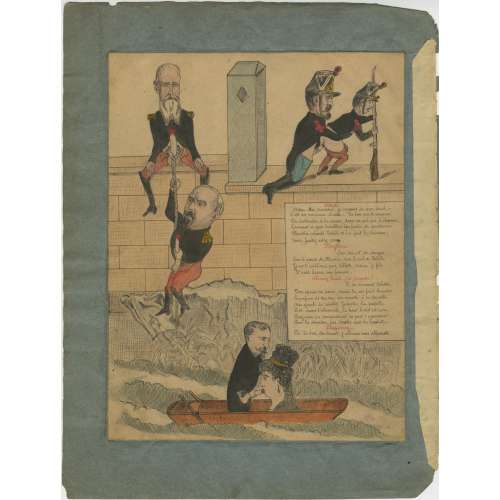 A series of seven political caricatures with indecent content, ink and pigment on paper, bound in a grey-blue folder. Each drawing is pasted to a grey-blue sheet of paper 32 x 24 cm. PLATES: 1) Villette; Bazaine; Alvarez Rull: 250 x 192 mm
A series of seven political caricatures with indecent content, ink and pigment on paper, bound in a grey-blue folder. Each drawing is pasted to a grey-blue sheet of paper 32 x 24 cm. PLATES: 1) Villette; Bazaine; Alvarez Rull: 250 x 192 mm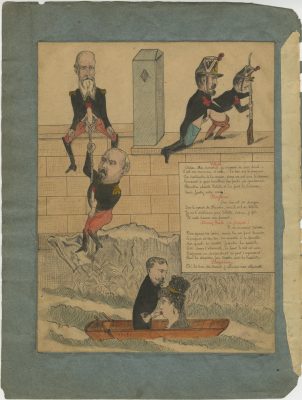
Villette Adieu, cher maréchal, je réponds de mon dard C’est un morceau d’acier… Là bas, sur le rempart, Sa cartouche à la main, dans un cul qui le charme, Lançant à gros bouillons son foutre de gendarme Plantin plante Delille et lui font le Caisson. Bazaine Sur ton vit de dragon Sur le nœud de Plantin, sur le cul de Delille, Je ne t’oublierai pas, Villette, adieu, je file Et je vais baiser ma femme. Alvarez Rull (à Josépha) Il ne saurait tarder, Ton epoux va venir, mais tu me fais bander, Le parfum de ton con me monte à la cervelle, Ma gaule se raidit . Josépha, la nacelle Est dans l’ obscurité, là haut, le ciel est noir, Bazaine en descendant ne peut t’ apercevoir … Pour la dernière fois, torche moi la houlette. Bazaine Eh ! là bas, du canot, j’allume une allumette!
Villette Farewell, dear Marshal, I vouch for my dick. It’s like a steel rod … Over there, on the ramparts, Plantin, his dick in hand, pounds Delisle’s beckoning ass And fills it with his bubbling gendarme’s cum. Bazaine For your dragoon’s dick, For Plantin's prick, for Delisle's ass, I won't forget you, Villette, goodbye, I'm leaving And I'm going to fuck my wife. Alvarez Rull (to Josépha) Hurry up, Your husband is coming, but I got a hard on you, The scent of your cunt penetrates my brain, My rod stiffened. Josépha, the gondola Is in the dark, the sky is black, Bazaine coming down and cannot see you... Give me one last blowjob.Bazaine Hey! Over there, from the canoe, I light a match!
French marshal Achille Bazaine capitulated to Bismarck during the Franco-Prussian war on 27 October 1870. In 1873, he was tried for treason and received a death sentence, later commuted to 20 years' imprisonment. Bazaine was incarcerated in the Fort Royal on Île Sainte-Marguerite, from which he escaped on August 9–10, 1874, with the help of Colonel Villette [Willette], his wife Josefa [Pepita Peña], and her nephew Alvarez Rull. They sailed to Genoa in Italy and from there to London. Plantin and Delisle were prison guards. The story was described in detail during the Trial of Col. Villette and his Accomplices in 1874 and published later in Robert Christophe. La Vie tragique du maréchal Bazaine. — Paris: Vautrain Jacques, 1947.
2) Impératrice Eugénie: 218 x 165 mm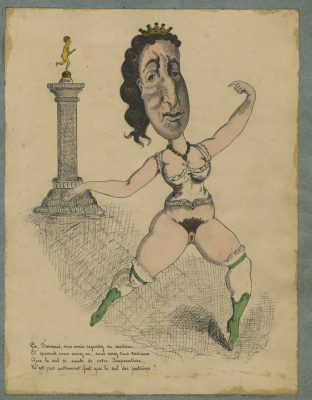
Ça, Français, mes amis, regardez sa matrice, Et quand vous aurez vu, vous serez tous certains Que le cul si vanté de votre Impératrice, N’est pas autrement fait que le cul des putains!
That, French, my friends, look at her cunt, And when you have seen, you will all be certain That the so acclaimed ass of your Empress, Is no different than the ass of whores! 3) Napoléon III: 215 x 168 mm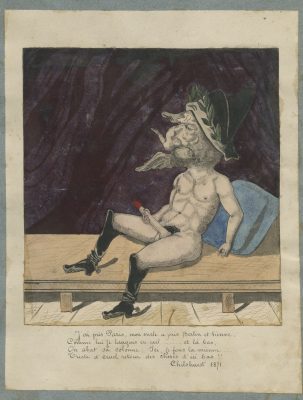
J’ai pris Paris, mon oncle a pris Berlin et Vienne. Comme lui je languis en exil …… et là bas, On abat sa colonne; Ici, je fous la mienne…. Triste et cruel retour des choses d’ici bas!! Chilshurst 1871. [i.e. Chislehurst]
I took Paris, my uncle took Berlin and Vienna. Like him, I, too, languish in exile. His column there was demolished; I’m jerking mine off here…. Cruel and sorrowful deeds!! 4) La confession: 216 x 168 mm (Georges Darboy?)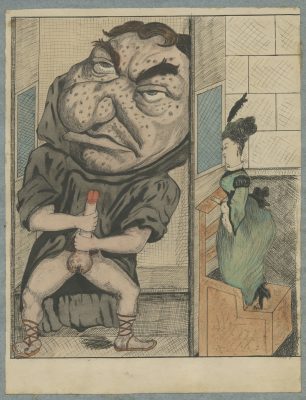 5) Napoléon III et Thérèsa (chanteuse Désirée Emma Valladon): 216 x 176 mm
5) Napoléon III et Thérèsa (chanteuse Désirée Emma Valladon): 216 x 176 mm
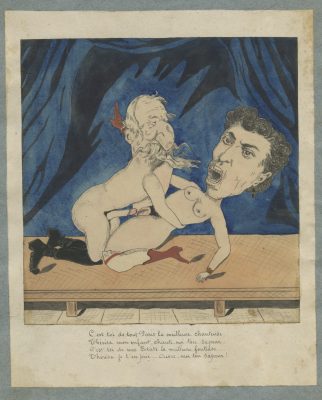
C’est toi de tout Paris la meilleure chanteuse, Thérèsa mon enfant, chante-moi ton sapeur. C’est toi de mes Etats la meilleure fonteuse.. Thérèsa je t’en prie … Ouvre-moi ton sapeur!
You, the best singer in all of Paris, Teresa, my child, sing for me where to insert. You are the best padding in my entire country… Teresa, please... Open your slit for me! 6) Thiers: 219 x 168 mm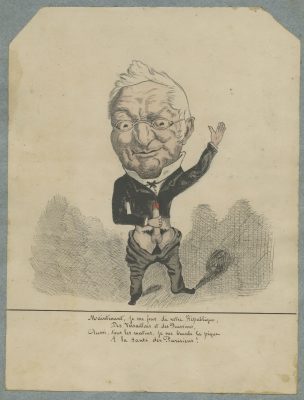
Maintenant, je me fous de votre République, Des Versaillais et des Prussiens, Aussi, tous les matins, je me branle la pique A la santé des Parisiens!
Yes, I don’t care about your Republic now, About Versailles and the Prussians, And every morning I jerk off For the health of Parisians! 7) Émile Ollivier/Rochefort/Jules Favre/Gambetta : 212 x 168 mm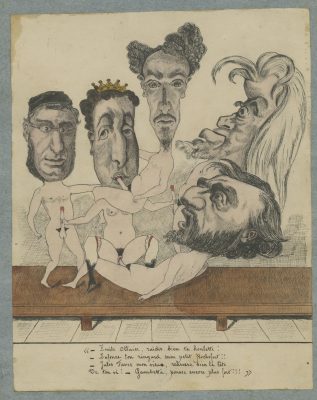
« — Emile Ollivier, raidis bien la houlette! — Enfonce ton ringard mon petit Rochefort!! — Jules Favre mon vieux, redresse bien la tête De ton vi! — Gambetta, pousse encore plus fort!!! »
Emile Ollivier, tighten your dick! - Stick in your poker, my little Rochefort!! - Jules Favre, old man, straighten your dickhead Damn it! – Gambetta, push even harder!!!Characters: Bazaine, François Achille (French, 1811 – 1888) Darboy, Georges (French, 1813 – 1871) Favre, Jules (French, 1809 – 1880) Gambetta, Léon (French, 1838 – 1882) Montijo, Eugénie de (Spanish-French, 1826 – 1920) Napoleon III [Bonaparte, Charles-Louis Napoléon] (French, 1808 – 1873) Ollivier, Émile (French, 1825 – 1913) Peña Azcárate, Josefa [Peña, Pepita] (Mexican-French, 1847 – 1900); Alvarez Rull – nephew of Josefa Peña Azcárate. Rochefort, Henri (French, 1831 – 1913) Thérésa [Valladon, Désirée Emma] (French, 1836 – 1913) Thiers, Adolphe (French, 1797 – 1877)
-
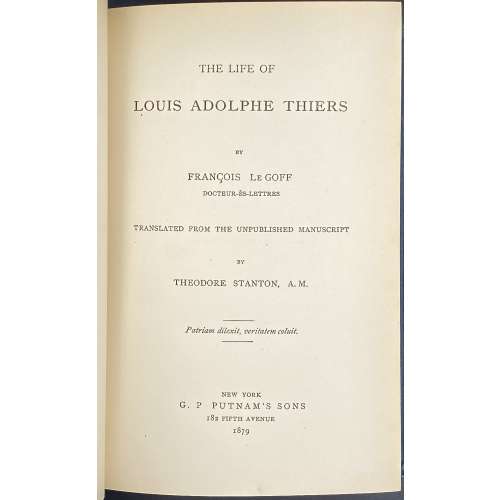 Title: THE LIFE OF LOUIS ADOLPHE THIERS | BY | FRANCOIS Le GOFF | DOCTEUR-ÈS-LETTRES | TRANSLATED FROM THE UNPUBLISHED MANUSCRIPT | BY | THEODORE STANTON, A. M. | {motto: Patriam dilexit, veritatem coluit.} | NEW YORK | G. P Putnam's Sons, 1879 | 182 FIFTH AVENUE | 1879 || Pagination: 2 blank leaves, frontis.: portrait of A. Thiers engraved on wood by J.I. Pease w/ tissue guard, [2] fac-simile of Thiers’s handwriting / blank, [2] - t.p. / copyright, [2] – dedication / blank, [2] – translators note / blank, [2] contents / blank, [vii] viii-xi [xii], [1] 2-353 [354 blank], [4] advert., 2 blank leaves; ill.: frontis., 1 woodcut plate, 1 folding manuscript fac-simile. Binding: dark-green cloth with bevelled margins, a gilt fac-simile of Thiers’s handwriting to front board, gilt lettering to spine. Note: The motto on the title page (Patriam dilexit, veritatem coluit) is taken from A. Thiers tomb on Père-Lachaise cemetery in Paris: "He cherished his homeland and worshipped the truth".
Title: THE LIFE OF LOUIS ADOLPHE THIERS | BY | FRANCOIS Le GOFF | DOCTEUR-ÈS-LETTRES | TRANSLATED FROM THE UNPUBLISHED MANUSCRIPT | BY | THEODORE STANTON, A. M. | {motto: Patriam dilexit, veritatem coluit.} | NEW YORK | G. P Putnam's Sons, 1879 | 182 FIFTH AVENUE | 1879 || Pagination: 2 blank leaves, frontis.: portrait of A. Thiers engraved on wood by J.I. Pease w/ tissue guard, [2] fac-simile of Thiers’s handwriting / blank, [2] - t.p. / copyright, [2] – dedication / blank, [2] – translators note / blank, [2] contents / blank, [vii] viii-xi [xii], [1] 2-353 [354 blank], [4] advert., 2 blank leaves; ill.: frontis., 1 woodcut plate, 1 folding manuscript fac-simile. Binding: dark-green cloth with bevelled margins, a gilt fac-simile of Thiers’s handwriting to front board, gilt lettering to spine. Note: The motto on the title page (Patriam dilexit, veritatem coluit) is taken from A. Thiers tomb on Père-Lachaise cemetery in Paris: "He cherished his homeland and worshipped the truth". -
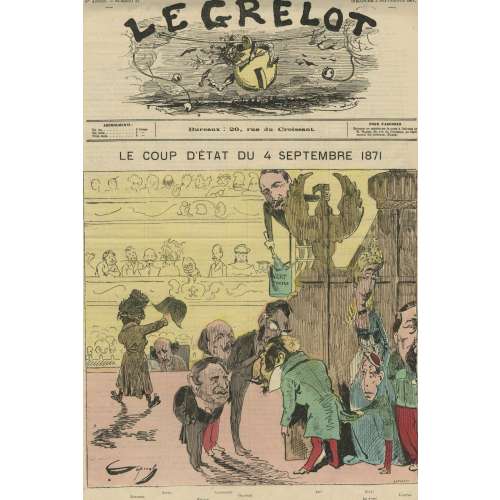 Le Grelot / journal illustré politique et satirique, №21, dimanche, 3 septembre 1871. Artist: Caporal (signed in the lower-left corner) Engraver/Printer: J. Lefman (signed LEFMAN SC in the lower-right corner) Title: LE COUP D'ÉTAT DU 4 SEPTEMBRE 1871. The Coup d'Etat of September 4th 1871. The artist equalled the 4th of September revolution when Napoleon III was ousted and the Second Empire collapsed, to a coup d'Etat. Although the number is marked September 3, it is dedicated to the events of September 4th. This was a usual French newspaper practice to postdate their issues. That's why they almost always operated with categories such as "today", "yesterday", and "tomorrow" instead of definitive calendar dates. "Le Grelot" means "The Sleigh Bell". Personages: Ratapoil – fictional personage invented by Honoré Daumier (French, 1808 – 1879), a Napoleon III caricaturized figure. Ratapoil is addressing the audience holding up Napoléon Bonaparte's tricorn cocked hat. Pietri – Joseph Marie Piétri [Joachim Piétri] (French, – is sitting in the first row, taking notes. Rouher – Eugène Rouher (French, 1814 – 1884), president of the Senat. Canrobert – François Marcellin Certain de Canrobert (French, 1809 – 1895), French Marshal, captured by the Prussian army in Metz with Marshal Bazaine during the surrender of Metz on October 28, 1870. Ollivier – Olivier Émile Ollivier (French, 1825 – 1913), head of the government. Hiding behind the theater decoration are: Napoleon III (Lui!), his wife Eugénie (Elle!), their son Prince Imperial (Le P'tit!), and Pierre Bonaparte (L'Autre). Sitting in the theatre box facing the scene: Adolphe Thiers (French, 1797 – 1877), Jules Favre (French, 1809 – 1880), Louis-Jules Trochu [Le General Trochu] (French, 1815 – 1896), and the other members of the "Government of National Defence". On the gallery: youngsters and two men in sans-culottes hats. An unidentified person on a ladder holding to an eagle figure is having a paintbrush and a bucket with 'tender green' paint. Ref: Musée Carnavalet
Le Grelot / journal illustré politique et satirique, №21, dimanche, 3 septembre 1871. Artist: Caporal (signed in the lower-left corner) Engraver/Printer: J. Lefman (signed LEFMAN SC in the lower-right corner) Title: LE COUP D'ÉTAT DU 4 SEPTEMBRE 1871. The Coup d'Etat of September 4th 1871. The artist equalled the 4th of September revolution when Napoleon III was ousted and the Second Empire collapsed, to a coup d'Etat. Although the number is marked September 3, it is dedicated to the events of September 4th. This was a usual French newspaper practice to postdate their issues. That's why they almost always operated with categories such as "today", "yesterday", and "tomorrow" instead of definitive calendar dates. "Le Grelot" means "The Sleigh Bell". Personages: Ratapoil – fictional personage invented by Honoré Daumier (French, 1808 – 1879), a Napoleon III caricaturized figure. Ratapoil is addressing the audience holding up Napoléon Bonaparte's tricorn cocked hat. Pietri – Joseph Marie Piétri [Joachim Piétri] (French, – is sitting in the first row, taking notes. Rouher – Eugène Rouher (French, 1814 – 1884), president of the Senat. Canrobert – François Marcellin Certain de Canrobert (French, 1809 – 1895), French Marshal, captured by the Prussian army in Metz with Marshal Bazaine during the surrender of Metz on October 28, 1870. Ollivier – Olivier Émile Ollivier (French, 1825 – 1913), head of the government. Hiding behind the theater decoration are: Napoleon III (Lui!), his wife Eugénie (Elle!), their son Prince Imperial (Le P'tit!), and Pierre Bonaparte (L'Autre). Sitting in the theatre box facing the scene: Adolphe Thiers (French, 1797 – 1877), Jules Favre (French, 1809 – 1880), Louis-Jules Trochu [Le General Trochu] (French, 1815 – 1896), and the other members of the "Government of National Defence". On the gallery: youngsters and two men in sans-culottes hats. An unidentified person on a ladder holding to an eagle figure is having a paintbrush and a bucket with 'tender green' paint. Ref: Musée Carnavalet


